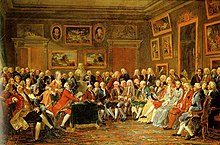
| Part of a series on |
| Classicism |
|---|
 |
| Classical antiquity |
| Age of Enlightenment |
| 20th-century neoclassicism |
| Part of a series on |
| Capitalism |
|---|
 |
| Part of a series on |
| Liberalism |
|---|
 |
The Age of Enlightenment (also the Age of Reason and the Enlightenment) was an intellectual and philosophical movement that occurred in Europe in the 17th and the 18th centuries.[1][2] The Enlightenment featured a range of social ideas centered on the value of knowledge learned by way of rationalism and of empiricism and political ideals such as natural law, liberty, and progress, toleration and fraternity, constitutional government, and the formal separation of church and state.[3][4][5]
The Enlightenment was preceded by and overlaps the Scientific Revolution and the work of Johannes Kepler, Galileo Galilei, Francis Bacon, Pierre Gassendi, and Isaac Newton, among others, as well as the rationalist philosophy of Descartes, Hobbes, Spinoza, Leibniz, and John Locke. Some date the beginning of the Enlightenment to the publication of René Descartes' Discourse on the Method in 1637, with his method of systematically disbelieving everything unless there was a well-founded reason for accepting it, and featuring his famous dictum, Cogito, ergo sum ("I think, therefore I am"). Others cite the publication of Isaac Newton's Principia Mathematica (1687) as the culmination of the Scientific Revolution and the beginning of the Enlightenment.[6][7][8] European historians traditionally dated its beginning with the death of Louis XIV of France in 1715 and its end with the outbreak of the French Revolution in 1789. Many historians now date the end of the Enlightenment as the start of the 19th century, with the latest proposed year being the death of Immanuel Kant in 1804.[9] In reality, historical periods do not have clearly defined start or end dates.
Philosophers and scientists of the period widely circulated their ideas through meetings at scientific academies, Masonic lodges, literary salons, coffeehouses and in printed books, journals, and pamphlets. The ideas of the Enlightenment undermined the authority of the monarchy and religious officials and paved the way for the political revolutions of the 18th and 19th centuries. A variety of 19th-century movements, including liberalism, socialism,[10] and neoclassicism, trace their intellectual heritage to the Enlightenment.[11]
The central doctrines of the Enlightenment were individual liberty and religious tolerance, in opposition to an absolute monarchy and the power of religious authorities. The Enlightenment was marked by an increasing awareness of the relationship between the mind and the everyday media of the world,[12] and by an emphasis on the scientific method and reductionism, along with increased questioning of religious orthodoxy—an attitude captured by Kant's essay Answering the Question: What Is Enlightenment?, where the phrase sapere aude ('dare to know') can be found.[13]
Cite error: There are <ref group=note> tags on this page, but the references will not show without a {{reflist|group=note}} template (see the help page).
- ^ "The Age of Enlightenment: A History From Beginning to End: Chapter 3". publishinghau5.com. Archived from the original on 3 March 2017. Retrieved 3 April 2017.
{{cite web}}: CS1 maint: unfit URL (link) - ^ Conrad, Sebastian (1 October 2012). "Enlightenment in Global History: A Historiographical Critique". The American Historical Review. 117 (4): 999–1027. doi:10.1093/ahr/117.4.999. ISSN 0002-8762.
- ^ Outram, Dorinda (2006), Panorama of the Enlightenment, Getty Publications, p. 29, ISBN 978-0892368617
- ^ Zafirovski, Milan (2010), The Enlightenment and Its Effects on Modern Society, p. 144
- ^ Jacob, Margaret C. The Secular Enlightenment. Princeton: Princeton University Press 2019 1
- ^ "The Enlightenment". Encyclopædia Britannica. Retrieved 16 November 2023.
- ^ Bristow, William (29 August 2017). "Enlightenment". In Zalta, Edward N.; Nodelman, Uri (eds.). The Stanford Encyclopedia of Philosophy. Metaphysics Research Lab, Stanford University.
- ^ Casini, Paolo (January 1988). "Newton's Principia and the Philosophers of the Enlightenment". Notes and Records of the Royal Society of London. 42 (1): 35–52. doi:10.1098/rsnr.1988.0006. ISSN 0035-9149. S2CID 145282986.
- ^ "British Library- The Enlightenment". Archived from the original on 24 August 2023. Retrieved 21 June 2018.
- ^ Smaldone, William (2014). European socialism: a concise history with documents. Lanham: Rowman & Littlefield Publishers, Inc. pp. 3–4. ISBN 978-1-4422-0909-1.
- ^ Eugen Weber, Movements, Currents, Trends: Aspects of European Thought in the Nineteenth and Twentieth Centuries (1992).
- ^ Eddy, Matthew Daniel (2022). Media and the Mind: Art, Science and Notebooks as Paper Machines, 1700–1830. University of Chicago Press.
- ^ Gay, Peter (1996), The Enlightenment: An Interpretation, W.W. Norton & Company, ISBN 0-393-00870-3